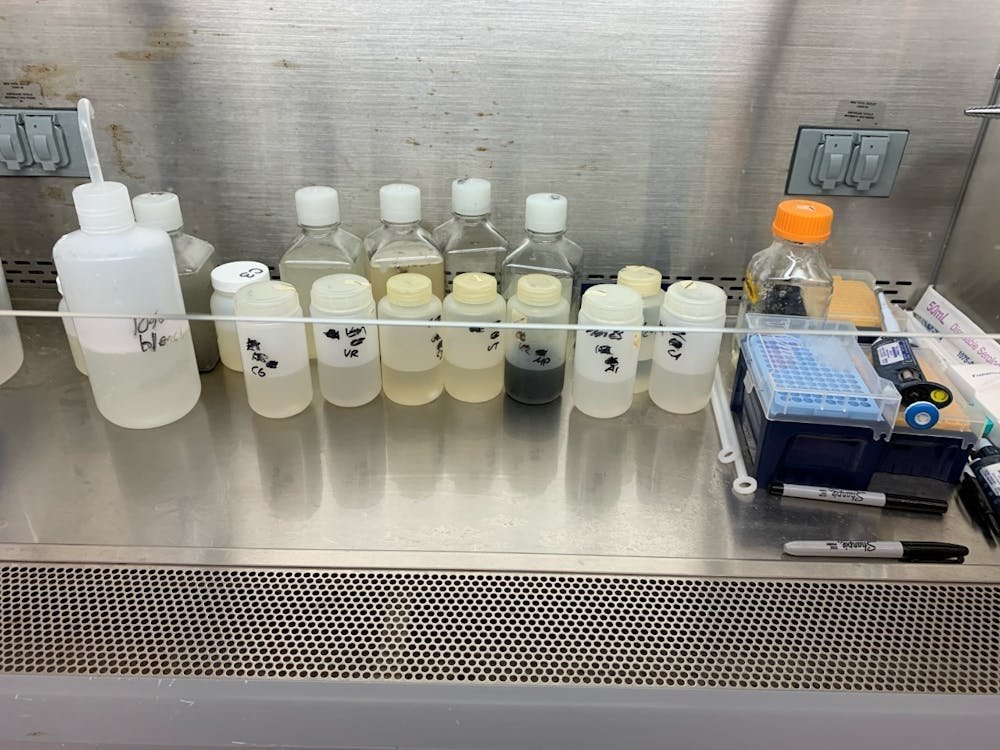CMU participates in statewide wastewater testing for COVID-19
As COVID-19 cases continue to rise across the country, scientists and health practitioners throughout Michigan are studying a new method of surveillance.
In May 2020, officials began to discuss the idea of wastewater testing as a form of COVID-19 surveillance to help predict future outbreaks.
Central Michigan University has partnered with health departments and universities across the state to study wastewater sampling as a method for gauging the amount of COVID-19 within communities.
Although other organizations may be testing pipelines from specific buildings, CMU is testing from downstream sewer water to identify which community may be infected.
College of Medicine faculty member Michael Conway was chosen to be the Principal Investigator (PI) of the study at CMU and works with the machinery used in the project.
"We are using a ddPCR (Droplet Digital Polymerase Chain Reaction) machine, which amplifies small amounts of target RNA or DNA by running an enzymatic reaction," Conway said. "This reaction uses specific strands of DNA (called primers) that will only interact with a target of interest. In this case, our target of interest is SARS–CoV–2."
Faculty members Elizabeth Alm, in the department of biology and Institute for Great Lakes Research, and Rebecca Uzarski, in environmental health safety, are co-principal investigators in the study.
“People who are infected with the SARS–CoV–2 virus shed it with their waste before they show any kinds of respiratory symptoms,” Alm said. "(Testing wastewater samples) can be used as kind of an early warning of the potential for an outbreak, especially in the community level."
Alm also said, because the entire state of Michigan is participating in the study, CMU will hopefully be able to build valuable relationships with other health districts and universities for future projects.
All the data collected by the different universities and health organizations will be compiled on a government database and later released to the public.
Conway said one benefit of this study is that it provides health departments with data that more accurately describes the amount of COVID-19 cases than traditional nasal testing. This is because the wastewater samples are tested for SARS specifically.
"You have to have SARS in order to have COVID but it's possible to have SARS and not have COVID-19," Conway said. "Just because you're infected, does not mean that you'll have the disease."
This also means, if a person has SARS, they can pass the disease to someone else who can then develop COVID-19; regardless as to whether or not the original person it themself. People who have SARS do not necessarily have symptoms of any kind. This means they will most likely not get tested, and no one will know they ever carried it. Wastewater testing negates this problem.
Alm, who is helping with sample design and troubleshooting for the project, agreed that wastewater testing would offer a more accurate representation of a community's health.
“By testing the wastewater, you have a composite sample of all the households,” she said. “It’s more efficient in that way than testing a lot of individual people.”
Although there are many plans and hopeful ideas for the future of this study, now the most important aspect is understanding the data itself.
“Right now we are trying to kind of perfect the techniques and understand what the data can tell us,” Uzarski said.
The wastewater testing project is also enlisting the help of CMU students who Uzarski believes will benefit from real-world experience.
“We want students involved,” she said. “We are literally learning about the biology of the virus as we are living through the pandemic … I think that’s very valuable.”
One of the students helping with the study is Tecumseh graduate student Andrew Marten, who is working in the lab with Conway.
“I hope that this research I’m doing right now on a very extreme public health issue will kind of turn some heads,” Marten said.
He hopes that the opportunity to work in the lab will open doors for other opportunities in the future.
Marten said that the team is collaborating with a lab over in chemistry and biochemistry to investigate different antiviral particles.
"We’re trying to transition that research not only to mosquitoes but also to this other coronavirus called OC43," Marten said. "Working with the different strains of coronavirus, like the less dangerous strains, will help us understand different antiviral therapies that can be applied to COVID-19."
Currently, the ddPCR system is available to CMU for a five-year contract supplied by the state. Efforts will stay focused on the coronavirus and how wastewater testing can help communities.
“The more data we collect, the greater our understanding of the situation will be, and that’s our goal,” Uzarski said.
The study will continue through December with final results coming back in early January. The team hopes that the research put forth by teams like the one at CMU will help encourage government funding to continue for future projects.







